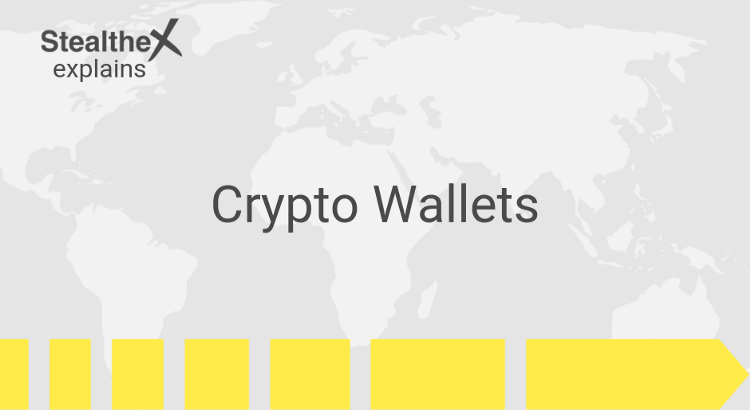Crypto Currency Wallets: 101

All the basic things you need to know about how crypto wallets work

So you are ready to buy your first crypto. Wondering how to store your coins? With so many crypto wallets out there it can be very tricky to decide where exactly to keep your digital currency, right? But here we are — an incredibly friendly StealthEX team — to guide and help you realize which type of wallet is just right for you.
Let’s start with some basics. What is a cryptocurrency wallet? In simple terms, it is a kind of a digital equivalent of a bank account that allows you to store, send and receive digital coins. The main feature is that crypto wallets have two important components: a public key and a private key. The public key is a wallet address to which anyone can send you coins. The private key is both a login and a password used to access your currency.
The other feature of crypto wallets is the fact that they don’t actually store currency in any physical form. And when someone sends you crypto, they are essentially signing off ownership of their coins to the address of your wallet. The transaction is confirmed by a record on the blockchain and a change in a balance in your crypto wallet.
There are different classifications of wallets. Let’s go through the main types and features of digital wallets.
1. Classification by type of access to the wallet:
- Hot wallets. These ones have access to the Internet and a blockchain in particular. They are considered ‘hot’ because of the greater ability for activity and accessibility. Just like cash in your pocket.
Pros: can help you make transactions in the blink of an eye, user-friendly.
Cons: security risks.
- Cold wallets. These are stored offline most of the time. Cold wallets are some kind of a safe where you can store a great number of digital coins for a long time.
Pros: high level of security.
Cons: not easy to access, low speed.
2. Classification by wallet’s “weight”:
- Heavy wallets. Require downloading the entire blockchain, which will later be stored on a computer occupying a significant place on your hard disk.
Pros: no risks of transferring personal information over the network.
Cons: risk of getting a virus on your computer, usage inconvenience.
- Light wallets. These ones access the blockchain via third-party services and therefore do not require downloading and storing the entire blockchain on a computer.
Pros: independence — you can choose which service to use, very easy to handle.
Cons: risk of hackers attack.
3. Classification by the ways of private key storage:
- Desktop wallets. These are downloaded and installed on your computer which gives you some security as you are unable to access this wallet from anywhere else aside from the actual desktop.
Pros: good security level, convenience, a great choice of wallets, free downloads.
Cons: risk of computer viruses and hacker attacks.
Examples: Exodus, Bitcoin Core.
- Mobile wallets. Run as an app on your phone, storing your private keys and allowing you to make transactions directly from your phone.
Pros: simple, very handy, free downloads.
Cons: risk of hacking, losing or damaging your phone which will lead to problems with access to your crypto.
Examples: Xapo, Coinomi.
- Online wallets. These run on a cloud service owned by a third party. In this case, the private keys are located on remote servers. This type of wallet allows users not only to open several addresses for different cryptocurrencies but also to trade on exchanges, estimate commissions using the built-in calculator and so on.
Pros: easy to use, able to work with multiple cryptocurrencies, high transaction speed.
Cons: security risks, additional expenses such a commission to the service.
Examples: HolyTransaction, Coinbase.
- Hardware wallets. The transactions are made online, but the private key is stored offline on a USB stick or a specially designed piece of hardware. These wallets can be considered as cold wallets until they are offline.
Pros: very high level of security, easy to set up and use.
Cons: expensive ($150–200), inconvenient if you need fast access to your coins.
Examples: KeepKey, Trezor.
- Paper wallets. A unique storage option representing a printed QR-code containing a public address and a private key. It is a super cold wallet. Great option for long-term storage for those who do not trust gadgetry.
Pros: highest level of security.
Cons: risk of destruction or loss of paper that contains wallet info, totally not for beginners.
Example: bitaddress.org.
As you can see there is no such thing as the best crypto wallet. The right wallet for you will be the one that matches your needs and the purpose of your cryptocurrency savings.
If you have any questions or comments, please hit us up in the comments below.
See you soon!
Follow us on Medium, Twitter, Facebook, and Reddit to get StealthEX.io updates and the latest news about the crypto world.
For all requests message us at [email protected].
Recent Articles on Cryptocurrency
 Toshi Price Prediction: Will TOSHI Coin Reach $1?
Toshi Price Prediction: Will TOSHI Coin Reach $1?  GoPlus Security Price Prediction: Will GPS Coin Reach $1?
GoPlus Security Price Prediction: Will GPS Coin Reach $1? 